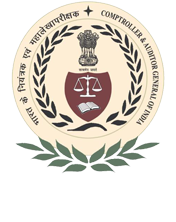Audit Reports

Jharkhand
Report No. 3 of 2023 - Report of the Comptroller and Auditor General of India on Direct Benefit Transfer in Jharkhand For the year ended 31 March 2021
Overview
Executive Summary
About the Report:
The Government of India started a major reform initiative to ensure better and timely delivery of benefits from Government to the people through Direct Benefit Transfer (DBT) since there was a critical requirement for sustained and determined action to remove leakages and enhancing financial inclusion in the process of delivering benefits like wage payments, fuel subsidies, food grain subsidies, etc.
Why did we take up this Report?
Considering the criticality of achieving its intended objectives and relative impact of DBT in social security pension scheme and scholarship schemes, the Performance Audit of Direct Benefit Transfer in Jharkhand (2017-21), was conducted during November 2021 to May 2022.
The objectives for carrying out the Performance Audit of selected social security pension schemes and scholarship schemes under DBT (cash only) were to ascertain planning and process in place to capture data of the beneficiaries; necessary process re-engineering done for implementation of DBT so as to minimise the intermediary levels, delay in payments to intended beneficiaries and pilferage and duplication and adequacy and effectiveness of the infrastructure, organisation and management of DBT.
The Scholarship schemes (SC, ST, BC and Minority) under ST, SC, Minority and BC Welfare Department were selected due to vulnerability, materiality of the schemes and in the backdrop of financial irregularity reported in media under minority scholarship scheme. Besides, a system Audit of “e-Kalyan Jharkhand”- a scheme-specific Information Technology software/ platform being used for DBT transfer to the eligible beneficiaries of “Pre and Post Matric scholarship schemes for SC, ST and BC category students” implemented by the ST, SC, Minority and Backward Class Welfare Department was also conducted to check the adequacy and effectiveness of built-in controls ensuring the reliability and integrity of data generated through the application.
Further, the social security pension schemes (Central as well as parallel State pension schemes) under Women, Child Development and Social Security Department were selected based on high expenditure of the department and to identify the overlapping and wrong inclusion of beneficiaries including delay in payment under the pension schemes.
In this context, we have tried to ascertain whether and to what extent beneficiaries have actually received the benefits in context of DBT implementation in the State.
This Performance Audit Report aims to identify the areas that require corrections and improvement in the selected schemes.
Main Audit Conclusions
Scholarship scheme (SC/ST/BC): Implementation of the scheme in the State was deficient. Electronic database of eligible students had not been prepared by test-checked DWOs for monitoring progress of students and for their holistic coverage. Instances of disbursement of scholarship to ghost/fake beneficiaries, reimbursement of scholarship to ineligible students, excess reimbursement of scholarship, payment of scholarships to passed-out students, disbursement of scholarships from multiple schemes etc. were noticed owing to reasons non‑compliance of norms of scheme guidelines and deficiency in
e-Kalyan scheme management software. Impact evaluation of scheme was not carried out to assess the effectiveness of schemes in achieving its objective.
Scholarship scheme (Minority): Implementation of Minority Scholarship scheme was very dismal in the State. Audit noticed instances of disbursement of scholarships to fictitious/ghost beneficiaries in 60 per cent test-checked institutes. Fraudulent disbursement of scholarships was made from even those institutes which neither register themselves on NSP nor obtained user credentials for log on to portal. Thus, user credential was misused for approval of scholarship to fake persons with the direct/indirect involvement of application verifying authorities. A district level government committee framed for verifying minority scholarship fraud reported in Dhanbad district confirmed the role of INO/DNO/SNO (application verifying authorities) in fraudulent approval of applications in its investigation report. Since, the stakeholders failed to perform its duties properly as defined under SOPs, involvement of ineligible/fake persons in minority scholarship could not prevented by department. Instances of irregular disbursement of scholarships to beneficiaries without verifying documents relating to eligibility criteria were also noticed. Evaluation studies at regular interval though required was not carried out as such effectiveness of scheme in achieving its objectives remain unnoticed to the department.
Social Security Pension Schemes: Data base of eligible beneficiaries for universal coverage was not maintained at districts/state level resultantly department remained unaware of the absolute number of eligible beneficiaries. Social security pensions were not approved within the prescribed time frame as instances of delay in approval up to 864 days in 39 per cent test-checked applications. Delay in disbursal of pensions among beneficiaries may cause hardship to the applicants and impede the pace of inclusion of new beneficiaries. Goal of social security pension schemes, to provide income support to beneficiaries for monthly sustenance remain under-achieved due to non‑disbursal of pensions on monthly basis as disbursement of pension was delayed one to four months. Social Audit of the scheme was also not conducted during 2017-21 which led non-evaluation of implementation of scheme at the bottom level of governance.
IT audit of e-Kalyan:
e-Kalyan application had gone live (January 2015) in the State. The features in the application envisaged at the time of project initiation were not delivered as of June 2022. The application was not integrated with Aadhaar e-KYC and also not linked with the Treasury/ Bank. Migration of the application to the National e-Scholarship Portal (NeSP) was not completed (June 2022). Institution level Users were not provided adequate training for verification of applications on the e-Kalyan portal as stipulated in the guidelines. Pre-defined format of password, masking of password and periodic change of login password were absent which indicated weak password policy being used by the department. Due to lack of input and validation controls in the application, irregularities like non-capturing of student details, same Aadhaar number used by different applicants, parent occupation and total fee paid by the applicant not in sync with annual family income, were noticed in the e-Kalyan database. Further, due to non/incomplete mapping of business rules in the application cases of excess payment of scholarship and payment of scholarship to ineligible beneficiaries were noticed. Project Management Unit was non-functional since November 2017 hence monitoring of ‘e-Kalyan’ remain ineffective.
What do we recommend?
In order to achieve the very objective of DBT under the scholarship and social security schemes the State Government should ensure following recommendations:
Scholarship scheme (SC/ST/BC):
- An exercise to keep electronic database of all eligible beneficiaries in the state for universal coverage and realistic budget preparations should be carried out.
- Monitoring and control mechanisms for verification of eligibility of applications as well as payments requires strengthening to make implementation of the scheme effective by checking/preventing irregularities/deviations.
Scholarship scheme (Minority):
- Government should initiate investigation to verify the financial irregularity throughout state and also take suitable action against the erring officials; and
- The State Government should ensure provision of benefits to eligible beneficiaries only by means of a suitable mechanism and fixing accountability/responsibility against the defaulters.
Social Security Pension Schemes:
- The State government should ensure timely disbursement of pensions to beneficiaries.
- Monitoring and control mechanisms for verification of eligibility of applications as well as payments require to be strengthened to make implementation of the scheme effective.
- The Social Audits should be conducted in prescribed intervals to ensure adequate monitoring of schemes.
IT audit of e-Kalyan:
- Envisaged features should be incorporated into the application.
- The application should be integrated with the Aadhaar e-KYC and linked with Treasury/ Bank as per scope of work under the RRR project.
- Migration of the application to NeSP portal should be done as per GoI instructions.
- Alternate arrangements for operation of the portal should be developed by the Jharkhand Agency for Promotion of Information Technology (JAP-IT) for reducing dependency on the service provider.
- Stakeholders of the application should be provided adequate training for optimal usage of the application.
Download Audit Report
- Cover Page
- Table of Contents
- Preface
- Executive Summary
- Chapter 1
- Chapter 2
- Chapter 3
- Chapter 4
- Chapter 5
- Chapter 6
- Appendices
- Abbreviations

